Fuel Spills on Highways: Emergency Cleanup
Fuel spills on highways, though not an everyday occurrence, present significant safety and environmental challenges when they do happen. Every year, hundreds of fuel spills occur across the United States, requiring emergency cleanups to mitigate the risks they pose to motorists, wildlife, and surrounding ecosystems.
The Causes of Highway Fuel Spills
Fuel spills on highways typically result from:
- Vehicle Accidents: Collisions involving commercial trucks or tankers transporting fuel are one of the primary causes of highway fuel spills. When these vehicles overturn or are damaged, they can release large amounts of gasoline, diesel, or other hazardous materials onto the roadway.
- Mechanical Failures: Leaks from vehicles, especially from large trucks with substantial fuel reserves, can also result in spills. Fuel tanks that are not properly maintained or secured can rupture during transit, leading to dangerous leaks.
- Tanker Truck Mishaps: Tanker trucks, which transport thousands of gallons of fuel, are particularly prone to large-scale spills if involved in accidents. A single tanker truck spill can result in a significant amount of fuel being released, often requiring immediate action from emergency crews.
- Pipeline and Refueling Station Accidents: Although less common on highways themselves, accidents involving pipelines or fuel stations near highways can lead to fuel seeping onto nearby roads, especially if the area is within close proximity to major transportation routes.
How Often Do Fuel Spills Occur?
The frequency of fuel spills that require emergency cleanup depends on a variety of factors, such as the volume of commercial transportation on a given highway, weather conditions, and the maintenance of vehicles. According to reports from the National Response Center (NRC), which tracks hazardous material spills in the U.S., there are hundreds of incidents annually involving fuel spills on highways. Most are relatively small, but larger spills that demand extensive cleanup occur several times a month across the country.
Some studies have found that major highways, particularly those with high commercial truck traffic, are more prone to spills. Interstates and highways that serve as primary routes for fuel delivery, such as those in areas with heavy industrial activity or near ports, tend to see more frequent incidents.
While smaller fuel spills (under 25 gallons) happen more often, large-scale spills requiring emergency response teams and hazmat intervention occur less frequently but still pose serious risks when they do.
The Impact of Fuel Spills on Safety and the Environment
Fuel spills on highways are not just traffic hazards—they can have serious environmental and health consequences. Immediate risks include:
- Fire Hazards: Fuel is highly flammable, and spills can lead to explosions or fires if ignited by a spark, especially in the case of gasoline.
- Traffic Accidents: Spilled fuel creates slippery road conditions, increasing the risk of further accidents and collisions. Motorists may lose control of their vehicles, leading to pile-ups or crashes.
- Environmental Contamination: Fuel spills can seep into nearby soil, groundwater, and waterways, causing lasting damage to ecosystems. The chemicals found in gasoline and diesel, such as benzene, toluene, and xylene, are toxic to both plants and wildlife.
- Human Health Risks: Exposure to fuel vapors can be harmful to people, particularly first responders and cleanup crews. Inhalation of these chemicals can lead to respiratory problems and other health issues.
Emergency Cleanup Procedures – Call Carolina Environmental Response Team 704-648-4858
When a fuel spill occurs, immediate action is required to prevent further harm. Emergency response teams are typically dispatched to contain and clean up the spill. The Environmental Protection Agency (EPA), along with local agencies and hazmat teams, coordinates the response, which often involves:
- Isolating the Area: The first step is to block off the affected section of the highway to ensure no further accidents occur and to keep the public safe from exposure to hazardous fumes or fire risks.
- Containing the Spill: Teams use absorbent materials, such as sand or special chemicals, to soak up the spilled fuel. This helps to prevent the fuel from spreading further, especially into storm drains or waterways.
- Environmental Protection Measures: In cases where fuel has spilled into the surrounding environment, barriers like booms or dikes may be used to stop the fuel from reaching sensitive areas like rivers or wetlands.
- Cleanup and Disposal: After the fuel is absorbed, contaminated materials, including soil or debris, are removed and disposed of according to hazardous waste regulations. Crews may also wash down the road surface to remove any remaining residue.
- Traffic Control and Road Repair: Once the spill is cleaned up, crews ensure the road is safe for traffic again. In some cases, especially where fires or explosions have occurred, sections of the road may require resurfacing or repair.
Preventing Fuel Spills
While accidents can’t always be prevented, there are several measures in place to reduce the likelihood of fuel spills:
- Strict Regulations on Tanker Trucks: The Department of Transportation (DOT) imposes stringent safety requirements on fuel transport vehicles. This includes regular inspections and protocols for securing and handling fuel tanks.
- Driver Training Programs: Commercial truck drivers undergo training in handling hazardous materials, which helps prevent accidents related to human error.
- Technology and Monitoring: Newer vehicles are equipped with sensors and monitoring systems to detect fuel leaks early, allowing drivers to take preventive action before a major spill occurs.
Call us for Emergency Response: 877-505-6799
Fuel spills on highways, while not a daily occurrence, are a significant concern when they do happen. They pose serious risks to both human safety and the environment, making emergency cleanup a crucial response. Thanks to rapid response teams and strict regulations, most spills are contained quickly, but with the increasing volume of traffic and fuel transportation, ongoing vigilance and improvements in technology will be essential to minimizing their frequency and impact. We are the best option for quick efficient cleanup.
